|
If there were awards given out for the best screen drunk (there probably are – the artistic community seem to hand out gongs for just about everything else), then the top prize would likely to go to Richard E. Grant in Withnail & I. This is a little ironic when you consider that Grant is a lifelong teetotaller and that he based his performance entirely on his observations of others and the one night in his life when he got hideously plastered on the orders of director Bruce Robinson, a man all too familiar with the pleasures of the bottle. What's great about Grant's performance is that it manages to be painfully funny and uncannily accurate at one and the same time. In the real world this would prompt most sober observers to shake their heads in pity or shuffle back a few feet with nervous smiles on their faces, but in a film it can be the stuff of comedy gold. But 25 years before Grant demanded the finest wines available to humanity, the title was held by a very different actor, one somewhat shorter and stouter and of Austro-Hungarian birth. I'll get to him in a minute.
One of the most common discussions about Corman's film adaptations of the works of Edgar Allan Poe revolves around the process of expanding short stories or poems into feature length movies, and in that respect his 1963 Tales of Terror should be off to a flying start. A portmanteau piece comprised of three short films, each taken from a Poe tale and with no Amicus-style linking story, all three are different enough in content and tone to sidestep the charges of element recycling that we tend to affectionately lob at the feature adaptations.
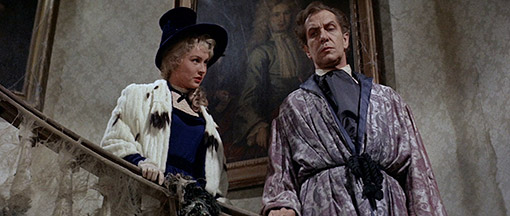
Having said that, the first story, Morella, is in some ways as archetypal as Corman Poe adaptations get. It begins in pictorially familiar fashion with a carriage arriving at an isolated and run down mansion owned by the reclusive Locke (Vincent Price), whose wife Morella died in childbirth 26 years earlier. His daughter Lenora (Maggie Pierce) has travelled there from Boston to be with her father, who is drunkenly morose and in no mood to talk to the woman he still blames for Morella's death. When Locke learns that his daughter does not have long to live, his hostility to her dissolves, but the spirit of Morella, whose decomposing body Locke has kept within the house, is not so forgiving.
In some respects a trial run for story elements that would be expanded on later in The Tomb of Ligeia but compressed into an economical 22 minutes, it's a compellingly paced and developed piece, one that never feels like it's been compressed from a longer work or that it's in an almighty hurry. Corman also makes genuinely unsettling use of superimposition for the image of Morella's wandering spirit (when it first appears it startles because you can't quite make out what you're looking at), though there are no prizes for guessing what happens to the house at the end.
In The Black Cat, screenwriter Richard Matheson takes the essence of one of Poe's most famous stories and runs with it to joyously comic effect, though if the success of any of the three stories here can be placed at the feet of the leading men, then this is the one. Peter Lorre plays drunken layabout Montresor Herringbone (as character names go, that's one of my all time favourites), who treats his attractive young wife Annabelle (Joyce Jameson) with cruel contempt, his only interest in her being where she might be hiding money that he can grab to spend on booze. And he really hates her cat. Her black cat. Thrown out of a bar for what we can only presume is the latest in a long line of drunken misdemeanours, he takes to begging from strangers, all of whom react with disgust at this plastered ruffian. Desperate for another drink, he stumbles into a well-to-do wine merchant's convention, whose star performer is the world-renowned wine taster Fortunato Luchresi, played with some relish by Vincent Price.
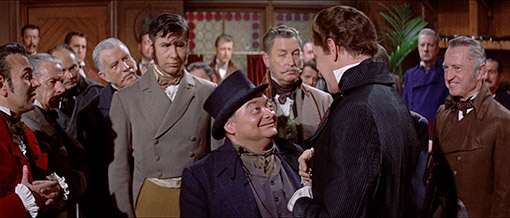
At this point I have to put the plot on pause to comment on Lorre's performance as professional booze-hound Montresor Herringbone. As I suggested above, as comic drunks go, this is up there with Richard E. Grant's turn as Withnail as one of the very best. Even if the rest of the film weren't up to scratch (and it is), I'd willingly and repeatedly cough up the entrance fee on a nightly basis to watch Lorre do his stuff here – his slurred speech is tinged with just the right dose of contempt and world-weariness, his moon-face and cod eyes seem to droop in a manner that suggests that physical collapse is always just a large brandy away, and his physical clumsiness is comically entertaining but never topples over into outright slapstick. Like Grant's Withnail, it's both funny and real, a comic tour-de-force by an actor known primarily for his villainous or nervous victim roles.
But it's when Herringbone challenges Luchresi to a wine tasting duel, claiming that he can identify wines every bit as accurately as his highbrow opponent, that the story goes into comic overdrive. Here Lorre and Price are sublimely matched, and its they who make this such an gloriousy funny sequence, from Price's hilarious pre-tasting exercises* to Lorre's bemusement at and gentle mockery of just about everything Price does, some of which plays almost as background action and is easy to miss on the first viewing.
A lot of wine later Luchresi wins the contest only because Herringbone's method of tasting – which involves throwing an entire glass of the wine down his throat – eventually causes him to collapse in a drunken heap. Luchresi helps him home and meets the exasperated Annabelle, and a few days later Herringbone is getting all the money he needs from his wife to go on drinking binges, as long is it gets him out of the house for a few hours. When did this start? Why the very night that Luchresi was introduced to his wife...
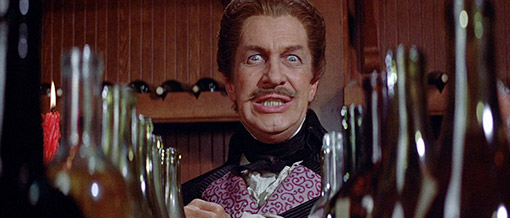
It's after this that the elements of the story with which most will be familiar come into play, and once again it's Lorre who takes centre stage, as a new found sobriety sees this figure of fun transformed into someone more coldly menacing. If I had to chose a favourite story in Tales of Terror, then for the performances alone, The Black Cat would be the winner. It's also inventively directed and even sports a distorted imagery dream sequence in which the ghosts of Herringbone's victims play a cheerful game of catch with his severed head while his body darts back and forth in agitated protest.
In the final story, The Case of M. Valdemar, Price plays the titular Valdemar, a man who is dying from a painful disease and has employed the services of mesmerist Carmichael (Basil Rathbone) to help ease his suffering. Both Valdemar's wife Helene (Debra Paget) and the handsome young Dr. James (David Frankham) distrust and dislike Carmichael, and are alarmed when Valdemar reveals that he has agreed to let this man hypnotise him at the moment of death to see whether the process can artificially extend life. There is, it turns out, good reason for their concern, as when the moment of Valdemar's passing finally arrives, Carmichael hypnotises him but then refuses to release him from this undead stasis.
Of the three stories here, The Case of M. Valdemar is probably the most chilling, not least for the very of concept of the purgatory in which Carmichael places Valdemar – disembodied and aware and surrounded by what we can only assume are other lost souls, the sound of his torment echoes beyond the walls of the bedroom in which his immobile body lays, leaving us to imagine the full nature of his suffering. The ending may play to horror expectations, but it's still creepily done and appropriately satisfying, and at least the house doesn't burn down in the process.
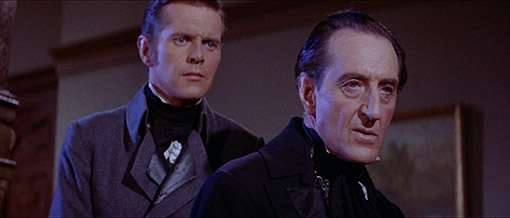
I've always been particularly fond of Tales of Terror, which like most horror anthologies tends to be held in slightly lower regard than its single story feature brethren. Sure, some elements aren't as fully developed as they are in the other films in this series, but the stories really lend themselves to the short film format, and Corman, Matheson and their talented cast work small wonders here, giving us all we need to know about each of the lead characters in a few economical minutes of screen time. It helps no end that all three stories are tonally different from each other and are so well handled in all departments. It would probably make for a fine introduction to the Corman Poe series for newcomers, and in one sense is almost like the Kellogg's Variety Pack Version of the cycle as a whole – the portions may be smaller, but the quality is the same and the product still tastes every bit as good.
The HD masters on all of the discs in this set were created by MGM and delivered by Hollywood Classics, with additional picture restoration work carried out at Deluxe Restoration in London under the supervision of James White for Arrow Video. Now I should state that I was initially unable to obtain our usual screen grabs (a hurdle that was unexpectedly overcome this very evening) and that I was tempted to use some grabs instead from MGM's previous DVD release for illustrative purposes only. But on comparing the two discs I just couldn't have done it, so superior is this new transfer to any previous digital release of the film. Framed in its original 2.35:1 aspect ratio, this really is a gorgeous transfer, boasting a splendid sharpness and level of detail, a spot-on contrast range and sumptuous colour, with the brighter blues and reds in particular leaping from the screen. The restoration work has cleaned up almost every trace of dust or damage and the image itself is rock solid in frame. There is some occasional faint flickering on parts of the image, but you have to be looking to spot it. Fabulous.
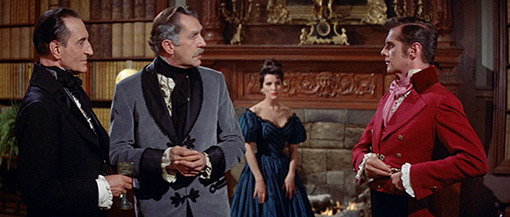
The Linear PCM mono 2.0 soundtrack is also in excellent shape, being clean and clear and with a better dynamic range than you might expect for a low budget film of this vintage.
Also included is an isolated music and effects track, which does tend to focus your attention of the key role played by Les Baxter's impressive score, and there's something rather spooky about watching Vincent Price speak and hearing only the distant howling of the wind.
The Directors: Roger Corman (58:32)
Without wishing to typecast televisual styles, when watching the opening titles of this episode from the 1999 documentary series The Directors, the swirling graphics and weepily heroic music made it clear from the start that this is American in origin. Fortunately the programme itself is a corker, a captivating trip through Corman's career that includes clips from many of the films he directed and produced and interviews with plenty of those whose careers he helped to launch, including Bruce Dern, Nancy Sinatra, Ron Howard, Diane Ladd, James Cameron, Jonathan Demme, Carl Franklin and Martin Scorsese. There is plenty of terrific material here, though as ever it's Corman himself who proves the star interviewee. He remains impossibly modest about his achievements, and expects to be remembered as "a medium range or lower range worker in films who contributed something on his own and also contributed something to giving other people opportunities." He also has a rather nice story about acting in The Godfather, Part II, and bemoans the then modern Hollywood's emphasis on the blockbuster at the expense of more interesting auteurist cinema. Little, it seems, has changed in subsequent years. If you can't get your hands on Corman's World, this will do nicely.
Kim Newman on Edgar Allan Poe (29:33)
The venerable Mr. Newman takes us on a hugely informative trip through the history of film adaptations of Edgar Allan Poe tales. Pleasingly, he only touches on the Corman films – there's plenty of info on them elsewhere in this excellent disc set – and should give even the horror aware a few titles to add to their viewing list. Great stuff.
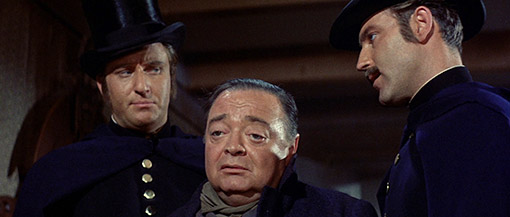
Cats in Horror Films (9:12)
Anne Billson, critic, author and creator of the Cats on Film blog, takes us on a whistle-stop trip through the various roles played by cats in horror movies. There's some interesting stuff here (well, sort of) and the titles are well selected, but I could have done without the ha-ha-ha staged eccentricity that has Billson – who is wearing the sort of gloves that suggest she'll be dissolving a body in acid when she's finished here – adorned with an ever-changing selection of fluffy toy felines.
The Black Cat (18:21)
An impressively faithful and handsomely realised film interpretation of Poe's celebrated story, co-written and directed in 1995 by Rob Green, who writes about the film in the book that accompanies this set. Green gets absolutely everything right here, not least in Tricia Stephenson's expressive production design (the prison cell in which the tale is related looks almost as if it was snatched out of Clive Barker's Hellraiser), in Simon Margetts' handsome and purposeful lighting camerawork, in the seamless manner in which the storytelling intermittent expands to include reconstructions of events, in the creative use of stereo sound, and most especially in Clive Perrott's arresting central performance as the tortured prisoner. You want to know how really use the short film format and faithfully adapt Poe? Look no further. Excellent.
Theatrical Trailer (2:22)
A trailer littered with spoilers for those who do not know the stories, though the narrator nicely sums up the difference between the two lead characters in The Black Cat when he tells us it's "where the lover of wine met the professional wine taster."
A splendid disc of a hugely enjoyable and too often underrated entry into the Corman Poe cycle, at present this is only available as part of Arrow's Six Gothic Tales box set and is one of several compelling reasons to get your hands on the full package. Great transfer, terrific extras, an absolute must-have.
* For the record, my girlfriend laughed so hard on her first viewing of this sequence several years ago that it has stayed with her to a degree that almost borders on annoying – almost every time she takes her first sip of wine when in the company of others, she imitates Price’s every move and colourfully interprets his comments about the origins of this particular vintage.
|